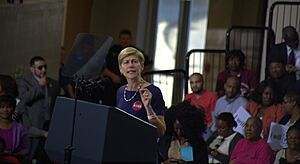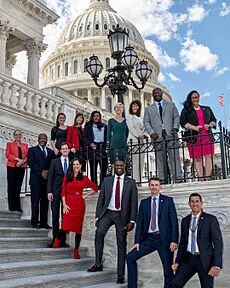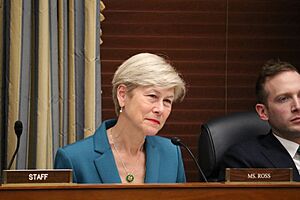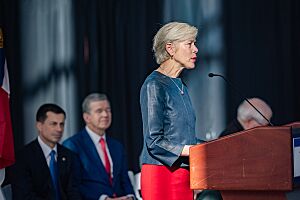Deborah Ross (politician) facts for kids
Quick facts for kids
Deborah Ross
|
|
|---|---|
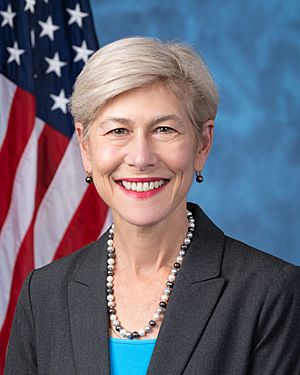
Official portrait, 2020
|
|
| Member of the U.S. House of Representatives from North Carolina's 2nd district |
|
| Assumed office January 3, 2021 |
|
| Preceded by | George Holding |
| Member of the North Carolina House of Representatives | |
| In office January 29, 2003 – June 1, 2013 |
|
| Preceded by | Bob Hensley (38th) Grier Martin (34th) |
| Succeeded by | Grier Martin |
| Constituency | 38th district (2003–2013) 34th district (2013) |
| Personal details | |
| Born |
Deborah Koff
June 20, 1963 Philadelphia, Pennsylvania, U.S. |
| Political party | Democratic |
| Spouse |
Stephen Wrinn
(m. 1994) |
| Education | Brown University (BA) University of North Carolina, Chapel Hill (JD) |
| Website | |
Deborah Ross (born June 20, 1963) is an American lawyer and politician. She is a U.S. representative for North Carolina's 2nd congressional district, which includes most of the state's capital city, Raleigh. She has served in this role since 2021.
As a member of the Democratic Party, Ross also served in the North Carolina House of Representatives from 2003 to 2013. In 2016, she ran for the United States Senate but was not elected.
Contents
Early Life and Schooling
Deborah Ross was born in Philadelphia, Pennsylvania, on June 20, 1963. She grew up in Connecticut. Her father was a doctor in the Air Force, and her mother was a teacher.
For college, Ross went to Brown University and graduated in 1985. She later earned a law degree from the University of North Carolina School of Law in 1990.
Career Before Politics
After law school, Ross worked as a lawyer in Raleigh. She also taught law classes at Duke Law School.
In 1994, Ross became the director for the American Civil Liberties Union (ACLU) in North Carolina. The ACLU is a group that works to protect the rights of people in the United States. She worked on issues like freedom of speech and improving the justice system for young people. She left the ACLU in 2002 to run for a seat in the state government.
In 2013, Ross took a job as a lawyer for GoTriangle, a public transportation agency for the Raleigh area. She later returned to working at a law firm in 2017.
Political Career
North Carolina Legislature
Ross was first elected to the North Carolina General Assembly in 2002. She served for about ten years. During her time as a state representative, she was chosen by her party to be a Whip. A whip's job is to make sure other party members are present to vote on important laws.
One issue Ross spoke about was protecting the state's coast. In 2012, she warned that ignoring scientists' predictions about sea level rise was like burying "head in the sand." She was worried that rising sea levels could cause more flooding and make insurance more expensive for people living near the coast.
2016 U.S. Senate Campaign
In 2015, Ross decided to run for the United States Senate. She won the Democratic primary, which is an election to decide who will be the party's main candidate.
In the main election, she ran against the Republican incumbent, Richard Burr. The race was watched closely across the country. In the end, Burr won the election with 51% of the vote, while Ross received 45%.
U.S. House of Representatives
Elections
2020 Election
In 2019, Ross announced she would run for the U.S. House of Representatives. The boundaries of North Carolina's 2nd congressional district had been redrawn, making it more likely for a Democrat to win. The previous representative, Republican George Holding, decided to retire.
Ross won the Democratic primary in March 2020. In the general election in November, she defeated the Republican and Libertarian candidates to win the seat.
What does she do in Congress?
As a representative, Ross helps create and vote on laws for the entire country. She serves on several important committees. Committees are small groups of representatives who focus on specific topics.
Her committee assignments include:
- Committee on the Judiciary: This committee deals with laws related to the justice system, courts, and crime.
- Committee on Rules: This powerful committee decides the rules for how bills will be debated and voted on in the House.
- Committee on Science, Space, and Technology: This committee oversees science agencies like NASA and research in areas like energy and technology.
She is also a member of several groups called caucuses, where members of Congress with shared interests work together. These include the New Democrat Coalition and the Democratic Women’s Caucus.
What Issues Does She Support?
As a member of Congress, Deborah Ross has supported several major laws.
She voted for the American Rescue Plan Act. This law provided financial help to families and businesses during the COVID-19 pandemic. It also increased the Child Tax Credit, which gave many families extra money each month to help with the cost of raising children.
Ross also supported the Infrastructure Investment and Jobs Act. This law provides billions of dollars to improve roads, bridges, and public transportation across the country, including in North Carolina. It also includes money to expand internet access and replace old water pipes.
She also voted for the CHIPS and Science Act. This law aims to increase the manufacturing of computer chips, called semiconductors, in the United States. After the law passed, a company announced plans to build a new $5 billion factory in North Carolina to make these chips.
Personal Life
Deborah Ross is married to Steve Wrinn. They live in Raleigh in a restored home in the historic Boylan Heights neighborhood.
Ross is a Unitarian Universalist.
Recent Election Results
2024
| Party | Candidate | Votes | % | |
|---|---|---|---|---|
| Democratic | Deborah K. Ross (incumbent) | 268,662 | 66.25 | |
| Republican | Alan Swain | 128,164 | 31.61 | |
| Green | Michael Dublin | 8,691 | 2.14 | |
| Total votes | 405,517 | 100 | ||
2022
| Party | Candidate | Votes | % | |
|---|---|---|---|---|
| Democratic | Deborah K. Ross (incumbent) | 190,714 | 64.68 | |
| Republican | Christine Villaverde | 104,155 | 35.32 | |
| Total votes | 294,869 | 100 | ||
2020
| Party | Candidate | Votes | % | |
|---|---|---|---|---|
| Democratic | Deborah K. Ross | 311,887 | 62.96 | |
| Republican | Alan Swain | 172,544 | 34.83 | |
| Libertarian | Jeff Matemu | 10,914 | 2.20 | |
| Total votes | 495,345 | 100 | ||
See also
- Women in the United States House of Representatives


